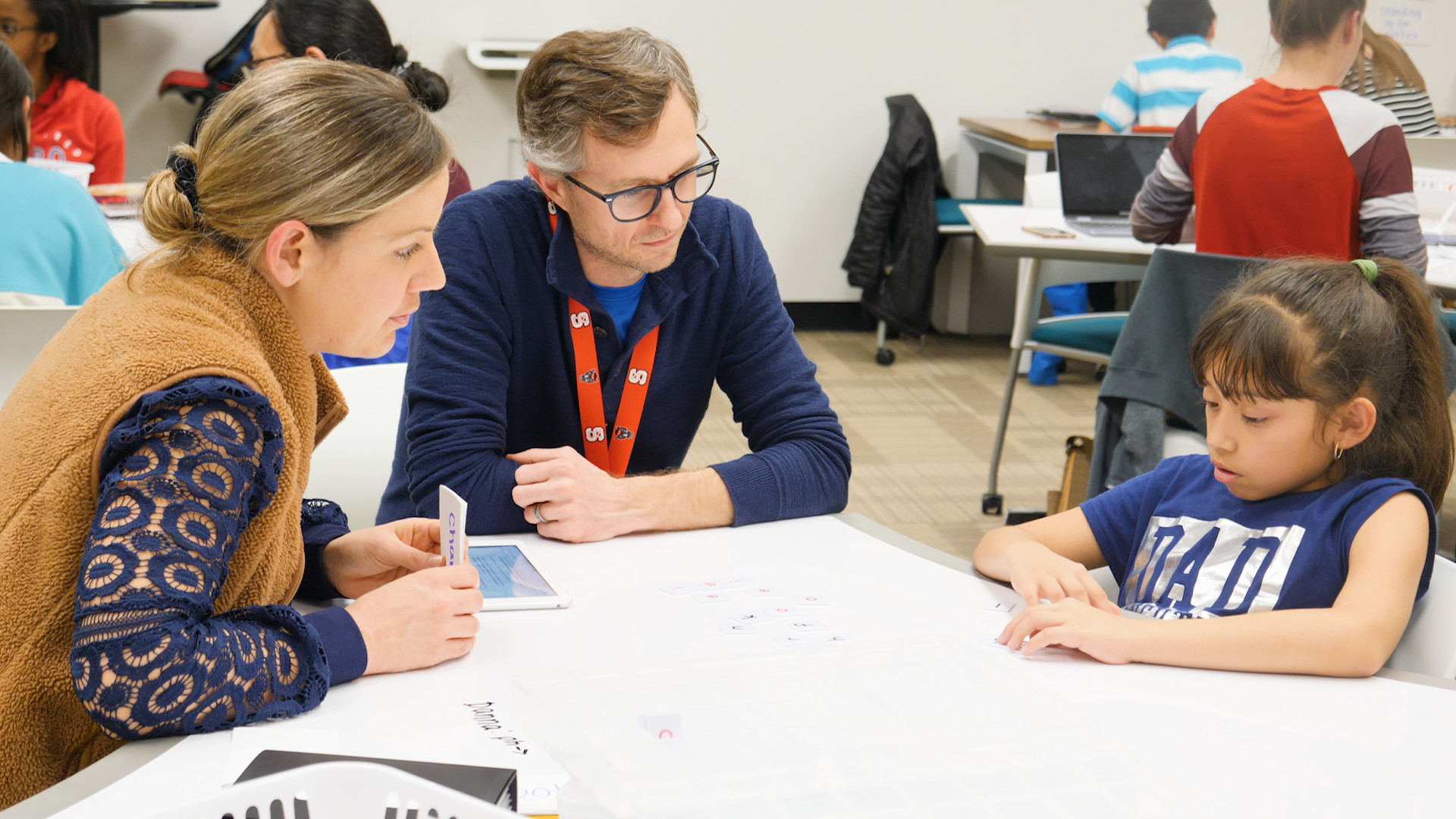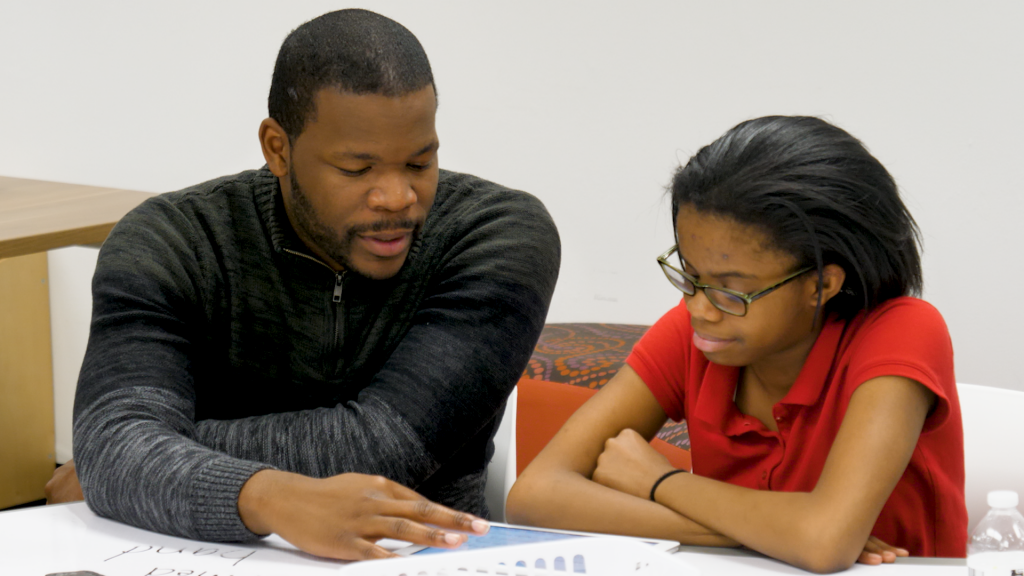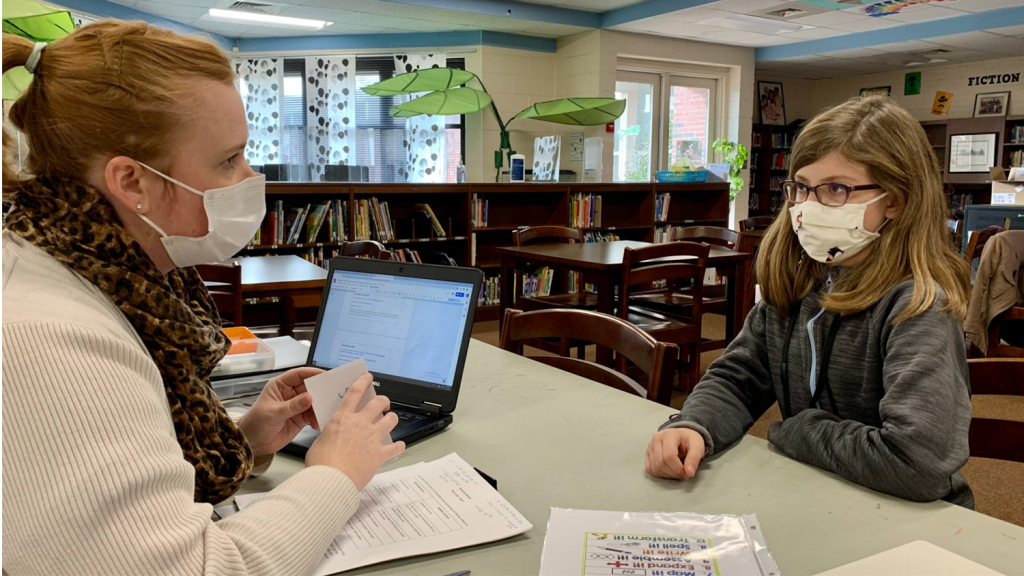College of Education Scholars Highlight What Teachers Know About Reading Instruction, Comprehension Through Recent Publications

Dennis Davis, an associate professor of literacy education in the NC State College of Education, is taking an asset-based approach to examining the way teachers understand important concepts in reading instruction.
Davis has co-authored three papers over the past year, along with Assistant Professor Jill Grifenhagen, Assistant Professor Jackie Relyea and doctoral students Robyn Delaco and Courtney Samuelson, that provide insights about educators’ specialized knowledge for teaching reading. He said there is an abundance of research literature in the field that focuses on what teachers don’t know about reading instruction, so he and his co-authors wanted to flip the narrative to showcase what teachers already know in order to capitalize on that knowledge.
“Teaching reading is complicated, and we want teachers to know a lot. It’s true that not all teachers have had the opportunities they need to learn all of the content they need, but I don’t think it’s helpful to continue creating deficit-oriented ways of thinking about teachers,” Davis said. “When you go in assuming teachers know a lot, and you look for it, it’s informative because then you can build new professional development opportunities that capitalize on what they already know rather than trying to fill holes or gaps.”
The first of three publications, “Using Insights from Teachers to Inform Online Professional Development in Early Literacy Instruction” — authored by Delaco, Samuelson, Grifenhagen and Davis – focuses on teachers who participated in the Teaching Foundational Reading Skills course that was hosted through Friday Institute for Educational Innovation.
The study discussed areas in which teachers sought opportunities to learn more as they engaged in the online course.
“As we look to design new opportunities for teacher professional development in early literacy, whether through an online course or another format, the more we know about what teachers already know, what they need to know and what they learn from professional development, the more effective professional development we can design,” Grifenhagen said.
The study found two prevalent themes related to what teachers found helpful or wanted to see more of. The first is that digital design features, such as videos and the ability to engage with other educators through forums, were helpful in promoting reflection on practice among participating educators.
Participants said videos modeling reading skills were the most helpful. Modeling examples like this, Davis said, serve as an important guide to help teachers unpack what they know about reading in order to provide language to the process and be able to explain and teach it to young children.
“It’s one thing to be able to say a word out loud and clearly articulate all the sounds or break the word into syllables,” Davis said. “Being able to explain it in a kid-friendly way and knowing how to find examples and choose the right words that will make sense to a kid, and knowing a good sequence of instruction that allows them to master a skill, those are all things related to practice that we learn by doing. A stepping stone into that is watching examples and videos to see what it looks like when it’s done well.”
The second theme that emerged through this study was that participants displayed a high level of engagement when working through concepts related to decoding and word analysis. For example, teachers who participated in discussion forums associated with the professional development course demonstrated new understandings of decoding concepts.
Although teachers also occasionally expressed confusion around how to apply new concepts to their classrooms and a desire to have deeper knowledge of literacy terms, the authors said understanding which concepts teachers want more help with can help inform future iterations of the online course.
“Teachers weren’t resistant to the knowledge, and they weren’t bringing wild misconceptions. They were trying to puzzle through and make sense of things that sounded a little different than things they had previously heard,” Davis said. “They were trying to build coherence around contradictory ideas, which is a great way for people to approach new learning. We hope that’s how all teachers are approaching new learning.”

Helping Teachers Get ‘KnERDI’ About Reading
For the second paper, “Getting KnERDI with Language: Examining Teachers’ Knowledge for Enhancing Reading Development in Code-Based and Meaning-Based Domains,” Davis, Samuelson, Grifenhagen, Delaco and Relyea explored the Knowledge for Enhancing Reading Development Inventory (KnERDI).
The instrument developed by the group measures teachers’ knowledge in alphabetic and code word reading as well as meaning and connected text processes. The group chose to call the instrument KnERDI – pronounced “nerdy” — because they believed it fit with the broader idea that teachers should embrace the idea of being a language nerd, Davis said.
“We want teachers to be interested in and curious about language. We want them to be cultivating classrooms where language is thought of as a playful thing,” he said. “Language is a thing you can reflect on and talk about and play with, so we wanted a name that kind of reflected that silliness. We thought KnERDI fit the bill.”
The tool and study were built from the assumption that young children can and should learn to read for meaning while learning word-level reading. It’s a blend that Relyea says is important to consider, especially in early literacy education.
“As young children begin to read texts, both word reading and comprehension skills take place interdependently. For example, they check their comprehension to see if they read a word correctly. Efficient word decoding can facilitate reading comprehension, so learning word-level reading and learning to read for meaning synergistically support each other in the early stage of reading development,” she said.
The research team used the KnERDI instrument to measure teachers’ knowledge, with the goal of using the information to target professional development efforts to increase knowledge in areas where teachers may need more support.
Results showed teachers demonstrated superior performance on items related to meaning and connected text processes compared to alphabetic and code word reading.
It’s important for teachers to have strong skills in both the word reading and meaning-based aspects of literacy instruction, the authors said, because effective reading involves a blend of both competencies.
To comprehend a text, a reader must be able to read the words automatically and accurately, which requires strong phonemic knowledge and knowledge of the language’s writing system, but they also need language comprehension skills that extend beyond the alphabetic code. These include understanding the grammatical structure of sentences, understanding how affixes and root words inform meaning, building a large vocabulary knowledge and being able to utilize inferential reasoning to piece ideas together while reading.
“To support students’ ability to read, we believe teachers should be equipped with knowledge and skills not only to teach foundational word reading skills but also to develop students’ fluency, vocabulary and comprehension skills, as well as content knowledge,” Relyea said.
“A lot of times, when people are talking about reading, they’re often talking about word reading because that’s the part of reading that’s really unnatural and unintuitive. Learning to match written scribbles to sounds in a language is very unnatural so, for good reason, we focus on that a lot. But, these other aspects of language are also important, not just for kids to be able to read, but for teacher knowledge,” Davis said. “Reading comprehension is very heavily dependent on background knowledge so, if you’re going to understand a text, you have to have both sets of skills.”
Like the first study, teachers surveyed for this research were participants in a professional development course offered through the Friday Institute. Grifenhagen said the ability to use this context to also gain new insights about teacher knowledge and professional development in early literacy will help to create future evidence-based professional development opportunities that assist educators in bridging the gap between learning new skills and implementing them in the classroom.
“We know that professional development needs to focus on content and feature active learning, but there is increasing evidence that job-embedded, sustained and collaborative professional learning supports such as coaching and professional learning communities (PLCs) help bridge teacher knowledge to teaching skills and practice,” she said. “In other words, knowledge is not enough to impact teaching, and we know that the things teachers do in the classroom are what make the biggest difference for students learning to read.”

Focusing on Literacy Skills Beyond Elementary School
Although a lot of literature about teachers’ specialized knowledge related to reading and comprehension focus on early elementary school educators, Davis believes all teachers, regardless of what grade or subject they teach, need to understand what reading looks like in order to support their students.
Although early elementary school teachers focus heavily on teaching young children how to read, children in older grades often still need specialized support in reading skills. In addition, teachers of non-ELA subjects, including science, social studies and math, often rely on the assumption that students are comprehending texts they’re assigned to read related to those disciplines.
“Every teacher is engaging kids in reading a text, having to draw ideas from it and using those ideas. So, any teacher, in any content area, regardless of the age of the child, has to have some ability to think about the meaning-making process that we do with texts as readers,” Davis said. “We’re not trying to turn every discipline into reading. The point we’re making is that there is reading involved in all disciplines, so you have to understand what reading looks like in your content area so that you can support those kids.”
For this reason, Davis’ latest paper, “What Do Upper‑Elementary and Middle School Teachers Know About the Processes of Text Comprehension?” focused on teachers in grades three through eight and included educators who specialized in subjects beyond English language arts.
Teachers who participated in this study shared with researchers how they conceptualize reading comprehension through open-ended, qualitative interview questions. Responses allowed Davis and his co-authors, including Delaco, to develop a four-part theory describing the way teachers of older readers understand reading comprehension.
First, researchers found upper elementary and middle school teachers understand how readers strategize and use a conventional set of strategies to make meaning with the text. Second, teachers also had significant knowledge related to the ways readers grapple with uncertainties and challenges in texts in order to reach a level of coherence.
Third, teachers understand how readers must use knowledge when reading, but are also consistently building new knowledge, changing the way they understand ideas and building new perspectives when engaging with a text. Finally, the study found surveyed teachers understood that students are participating in a social process when reading. When engaging in a text, students are not only in conversation with the author; they may also be engaging in actual conversations with other readers and shaping their meaning-making of the text through ways of thinking that are shared through this social process.
“Across these four facets of concepts, we think that we’ve presented a pretty asset-based way of thinking about how teachers actually do know quite a bit about comprehension, and it links up with four areas of literature that are pretty important,” Davis said.

Using Research to Inform Practice
Using the insights gained through these three publications, Davis has created a short video series to help illustrate select literacy concepts for teachers in the Yadkin Wolfpack Literacy Partnership.
The Yadkin Wolfpack Literacy Partnership, which is funded by more than half a million dollars from the Mebane Charitable Foundation, uses a cohort-based Master of Education program to enable teachers within Yadkin County Schools to gain advanced expertise to effectively implement evidence-based literacy instruction.
Davis said he and his project team have created seven videos, which they’re calling “KnERD Bites,” that will be released one at a time over the coming weeks. Videos focus on topics including helping children with word reading, supporting comprehension, sound structure, phonology and phonemic awareness, and systematic phonics instruction.
“These aren’t videos of practice. They’re really videos that help teachers think through some important concepts,” Davis said.
The Yadkin Wolfpack Literacy project, which began in 2019, is already having an impact on participating teachers.
Melissa East, a third grade teacher who will graduate from the College of Education with her master’s degree through the program in May, said she has already seen the lessons she’s learned from the program have an impact on her students. For example, inspired by a video shared with her through program coursework, East has incorporated new ideas in her classroom to help students build their vocabulary.
“It has been a learning adventure, and I mean adventure in the best way because I’ve learned so many things that have really been impactful in a positive way in my classroom,” she said. “It’s bringing positive change to my life and to the lives of my students, and I think that’s probably the most rewarding part. To be part of something where I can learn something one day and then apply it to my classroom the next day is pretty awesome.”
- Categories:


